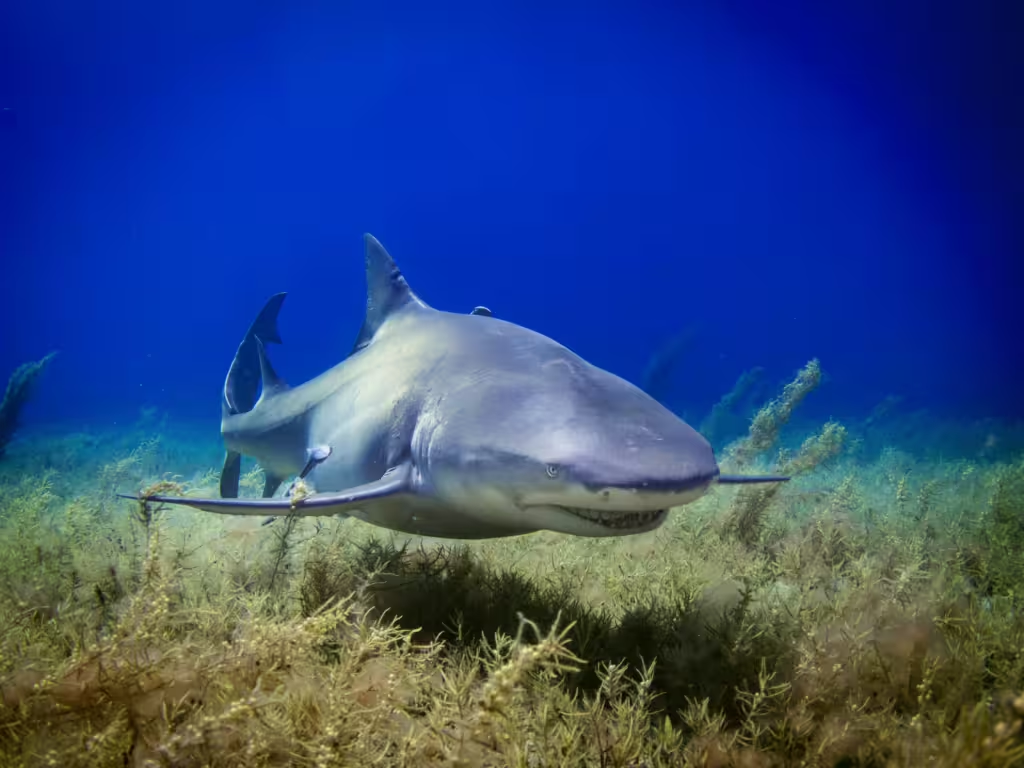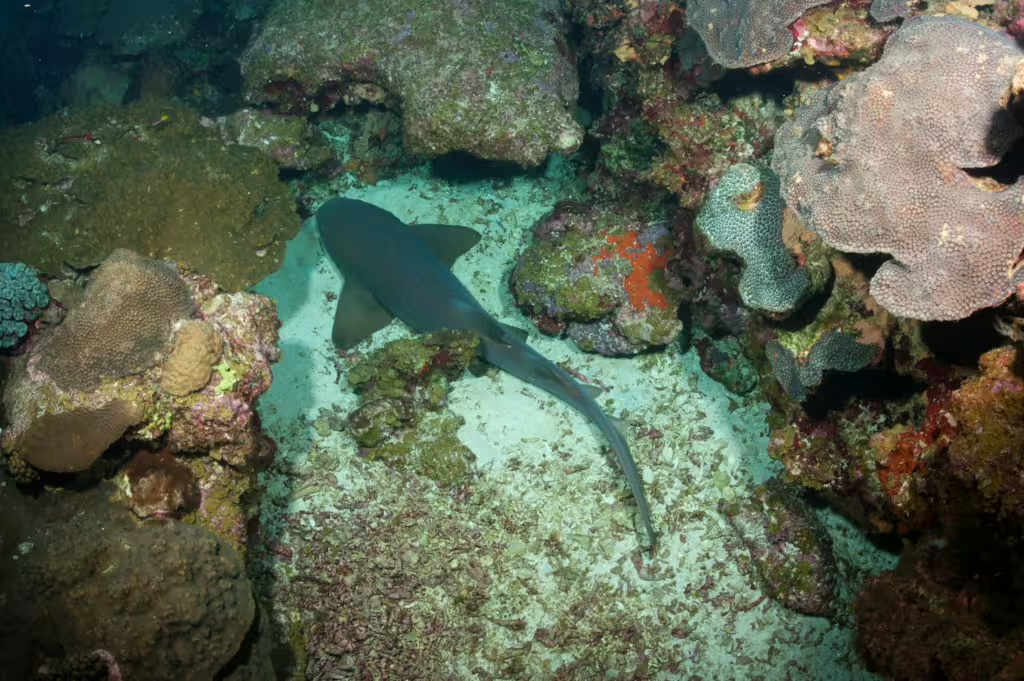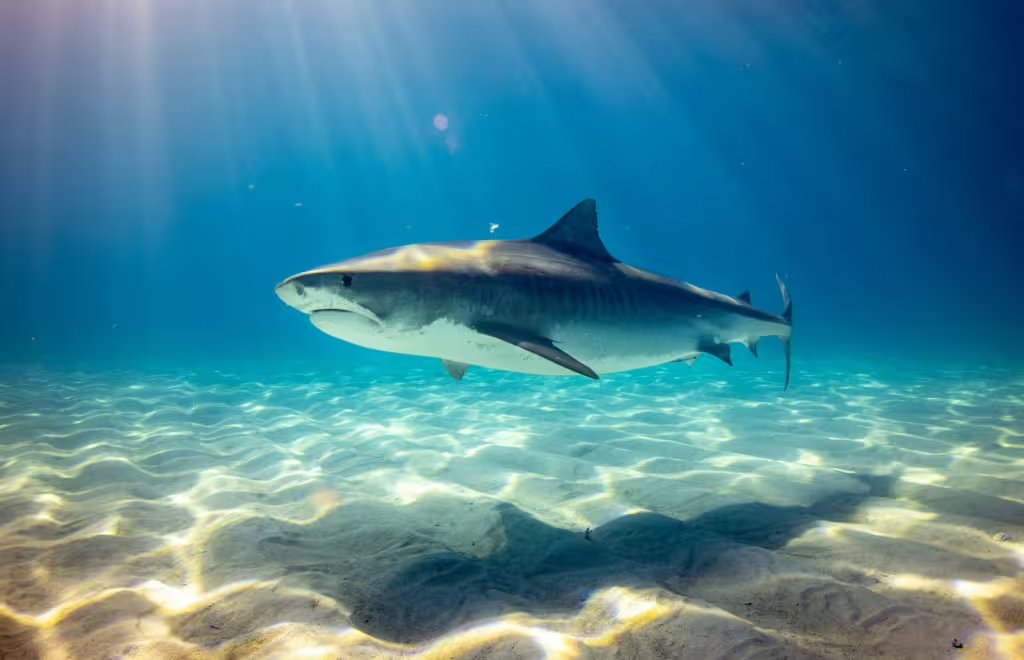No, it isn’t Shark Week yet, but here at True Investigator, we are positively obsessed with these Pelagic predators! Why wouldn’t we love sharks? These toothsome hunters have been swimming through Earth’s oceans for more than 400 million years. They were around long before dinosaurs roamed the planet and have remained millions of years after the dinosaurs shrunk their way down into modern birds.
Possessed of sleek bodies and sharp teeth, sharks are some of the most iconic and frightening creatures of the deep. This also makes them some of the ocean’s most misunderstood animals. Despite their fearsome reputation, sharks play a vital and complex role in oceanic ecosystems. Sharks aren’t just apex predators, they are key players whose presence and behaviors have far-reaching effects on the marine environment.
In this article, we will explore the many roles that sharks play in underwater ecosystems. We will learn how they control prey populations and influencing marine biodiversity. We will explore how sharks contributing to the health of coral reefs and seagrass beds, while touching briefly on the importance of shark conservation, especially now.

Sharks as Apex Predators
One of the most important roles sharks play in the ocean is that of the apex predator. For untold millennia, sharks have sat atop of the marine food chain, surpassed only by a few rare whales, the colossal squid, and, of course, human beings. The point is, sharks have few natural predators themselves. As such, their position allows them to exert significant control over the populations of the species they prey upon. The result is a homeostasis of marine biodiversity, a balance that needs to be maintained for these biomes to remain healthy.
Controlling Prey Populations
Sharks, like many apex predators, seek out weak, old, or sick individuals among their prey animals, which keeps marine populations healthy and allows the strong to survive and sire a new, stronger generation. Sharks also keep the numbers of their prey in check, which prevents any one species from becoming too numerous or depleting needed resources. When shark numbers decline in an area, prey species become overpopulated, leading to overgrazing or overconsumption of other organisms, and disrupting the entire food web.
Scientists have already observed this phenomena in areas where sharks have already declined. In one instance, a lack of sharks led to explosions of certain species, such as rays, which in turn can lead to the depletion of shellfish populations like scallops. This overabundance of prey species is sometimes referred to as a “trophic cascade,” and it is the bane of natural ecosystems everywhere.
Preventing Disease Spread
It may not seem like it, but sharks also help prevent the spread of diseases within marine ecosystems. They do this by hunting and consuming weak and sick animals, thereby reducing the number of diseased individuals in prey populations. This is a part of natural selection, and it ensures that only the strongest and healthiest animals survive and reproduce. Without sharks to remove these weaker individuals from the school, diseases can run rampant, causing potential mass die-offs that would destabilize the entire ecosystem in a matter of weeks.
Keystone Species: The Ripple Effect of Sharks
A keystone species is one that fits a certain, crucial role in maintaining the stable structure of marine ecosystems. They are so important, in fact, that the removal or significant reduction of sharks can have a dramatic impact on the health and function of ocean environments.
Trophic Cascades
Earlier, we mentioned something called a trophic cascade, a catastrophic event that drastically changes the biodiversity of an area. The loss of an apex predator cause a series of reactions throughout the food chain, ultimately affecting species all the way down at the bottom. This ripple effect can have unexpected and negative consequences through the ecosystem.
One example has been observed in a region where sharks have declined due to overfishing. This situation led to an increase in the population of smaller predatory fish, like groupers and snappers. These fish, in turn, consumed large numbers of herbivorous fish that are essential for grazing on algae in coral reef systems. With those grazers gone, the algae blooms out of control, smothering local coral reefs and sapping oxygen from the surrounding water. Thus we see how sharks can be essential for the continued health of coral reefs.
Influence on Marine Biodiversity
Sharks feed on prey in such numbers that they can regulate the prey population simply by existing. Where sharks are abundant, ecosystems thrive, and this is usually due to the increased level of biodiversity in an area. This is because no single species is allowed to dominate an area, even the sharks. A more diverse ecosystem is healthier than one threatened by the existence of a monolithic prey or predator population.
Sharks and Coral Reef Health

Coral reefs are among the most important marine ecosystems on the planet. Not only do they house a vast array of different marine species, they act as nurseries for some distinctive species. Sharks play a vital role in maintaining the health of these biomes and are closely linked to the well-being and continued health of coral reef systems.
Regulating Predator and Herbivore Populations
Because sharks are the apex predator in any given region, they help to regulate the populations of lower-tier predatory fish within the reef. These fish tend to feed on herbivorous species like parrotfish and surgeonfish, which are essential for grazing on algae and keeping the coral healthy. If left unchecked, this algae can overgrow and suffocate corals within days.
The subsequent degradation and loss of coral structures creates a ripple effect that drives marine animals away from their homes. Healthy shark populations ensure that this does not occur, because their presence helps maintain a balance between predators and herbivores, ensuring that coral reefs remain vibrant and teeming with biodiversity.
Indicator of Ecosystem Health
If you find yourself in a coral reef and you see a bunch of sharks around, don’t worry. Well…you should be careful, but the presence of sharks in a coral reef is often a good indicator of the overall health of the reef. Sharks thrive best in well-balanced ecosystems that are rife with biodiversity. The absence of sharks, however, means that the ecosystem is under significant strain, or may even be on the verge of collapse. This can be due to a number of factors such as overfishing, pollution, or other human activities.
Seagrass Beds and the Role of Sharks
In addition to their impact on coral reefs, sharks play a crucial role in maintaining the health of seagrass beds. These important habitats are home to a host of important marine species, such as fish, crustaceans, seafaring reptiles, and marine mammals.
Dugongs and Turtles: Grazers of Seagrass
Dugongs and sea turtles are quite fond of seagrass beds, and their grazing helps keep the beds healthy. Their constant nibbling promotes growth and prevents the overgrowth of algae. A seagrass bed bereft of sharks, however, alters the grazing patters of these animals, and can cause ecological turmoil.
Dugongs and sea turtles tend to be more careful about their grazing when they know sharks are about. They tend to move from one patch to another instead of staying in one area for too long and overgrazing. If they aren’t worried, the poor beasts will heavily overgraze, wiping out part of the bed rather than promoting seagrass regrowth.
Sharks as Protectors of Seagrass
The degradation of seagrass beds doesn’t simply affect the dugong and sea turtle populations, it affects everything. You see, seagrass beds are essential for carbon sequestration, which means they help to absorb excess carbon dioxide from the atmosphere. This mitigates the effects of climate change. Without these underwater carbon sinks, the far-reaching environmental consequences could be catastrophic, for marine animals and people alike.
The Threats Facing Sharks

Humans are the greatest threat to sharks that we know of today. Of all the numerous threats that sharks face from day-to-day, human-created problems like overfishing, habitat destruction, and climate change top the list. These environmental disasters in the making are taking a toll on shark populations, and many species are now considered endangered or vulnerable as a result.
Overfishing and Shark Finning
One of the most significant threats to sharks is overfishing. Whether they mean to or not, fisherman often mistakenly catch sharks in their nets. Marine animals that get caught up in this method are known as bycatch in commercial fishing operations, but it means the death of the sharks either way.
Some cultures hunt shark for their fins specifically, to make delicacies like shark fin soup. This practice, known as shark finning, is positively barbaric. It involves removing the fins from a shark and discarding the rest of the animal, often while it is still alive. If you are thinking that shark finning happens less frequently than accidental bycatch, think again. Shark finning has led to a dramatic decline in shark populations around the world, with some species experiencing a 90% reductions in population.
b. Habitat Destruction
Like many terrestrial animals already facing the same, shark populations are threatened by the destruction of their natural habitats, particularly in coastal areas where development, pollution, and climate change are so prevalent. Mangroves, coral reefs, and seagrass beds are all important locales for healthy shark populations, and each one under threat from human activities of some kind.
Climate Change
Climate change is affecting ocean temperatures, forcing sharks to migrate to new areas, thereby disrupting local food webs as a result. The warming of the planet also affects sea levels and the distribution of marine species, making seagrass beds and coral reefs uninhabitable in some cases due to algae blooms and mass coral bleaching, respectively.
Shark Conservation: A Path Forward
Like so many species, the declining numbers of shark populations due to human activities have already begun to cause significant disruptions to marine ecosystems. That’s why it’s so important that human beings work to conserve remaining shark populations. These conservative efforts are essential for maintaining the health and balance of oceanic biomes. Modern efforts to protect sharks include establishing marine protected areas (MPAs), enforcing regulations on shark fishing, and raising public awareness about marine conservation.
Marine Protected Areas
Marine protected areas, or MPAs, are regions of the ocean where human activities, including fishing, are restricted or prohibited by law. Think of them as national parks under the water. These areas provide a safe haven for sharks and other marine species, allowing populations to recover and thrive. MPAs have been shown to be effective in restoring shark populations, in the past. Many such populations have bounced back in regions where overfishing once caused significant shark population decline.
Shark Sanctuaries
You’ve probably heard of sloth sanctuaries or tiger sanctuaries, but have you ever heard of a shark sanctuary? Many countries have established shark sanctuaries, which provide critical protection for endangered or vulnerable shark species. Hunting and fishing for sharks is completely banned in these sanctuaries, and their presence has contributed to the preservation of marine ecosystems.
Public Awareness and Education
As silly as it sounds, television programs and theme weeks like Shark Week, contribute greatly towards raising awareness about sharks. Educational programs and conservative efforts also help to dispel myths about their perceived danger that sharks pose to humans. Such informative programs highlight the vital role that sharks play in ocean habitats, thereby shifting public perception and encouraging support for conservation efforts like shark sanctuaries.
True Investigator Says…
Sharks are more than just the fearsome predators of Hollywood blockbusters; they are essential to the health and balance of marine ecosystems the world over. As apex predators and keystone species, sharks help to regulate prey populations, maintain biodiversity, and protect oceanic habitats that are vital to the survival of the planet. However, despite being necessary for the survival of coral reefs and seagrass beds, sharks are still facing numerous threats from human activities. It’s unfortunate, but their decline is already having far-reaching consequences for marine environments and coastal human settlements.
Still, people are working to help these misunderstood animals. Through conservative efforts and articles like these, we can continue ensure the continued health and protection of the undersea world. Saving sharks doesn’t just protect an ancient relic, it helps save us all from a bleak and fishless future.
Discover more from TrueInvestigator
Subscribe to get the latest posts sent to your email.


